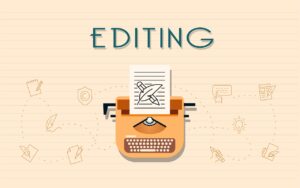Do you need a book editor? If so, contact me, and let’s discuss your manuscript.

If you need a book editor, this article is an excellent place to start!
Why Do You Need A Book Editor, And What Does Book Editing Entail?
When you ask a book editor to “edit” your book, he or she will want to know the genre (fiction such as sci-fi, mystery, romance, etc. or nonfiction such as an autobiography, true crime, historical account, etc.) He or she will also assess what type and level of editing is required before giving you a quote.
Yes, there are many types of book editing services and one size certainly doesn’t fit all.
Some authors need nothing more than proofreading. Others need copyediting, line editing (also known as line-by-line editing), developmental editing, substantive editing, ghostwriting, and/or research and fact-checking editing.
Below is a short explanation of what these services mean and a general ballpark of costs, which can fluctuate based on an editor’s experience, level of expertise, and portfolio.
Proofreading
Usually, authors hire proofreaders in the very last pre-publication stage to surveil for misspellings, capitalization errors, grammar and punctuation errors, and other simple errors that slipped through the cracks in earlier reviews. This is the least expensive form of book editing, generally quoted at .02¢ to .03¢ per word, depending on the complexity of the book (for instance, with or without footnotes or end notes, with or without appendices, etc.).
Copyediting
Copyediting also addresses the mechanics of grammar, punctuation, capitalization, and spelling but goes further. A copyeditor will improve readability by reviewing your work for repetition, inaccuracies, and sentence structure. This work is often quoted from .03¢ to .05¢ depending on the degree of difficulty (for instance, citations and the back matter mentioned above, but also adherence to your writing style guide, which is generally the Chicago Manual of Style or CMOS for novels).
Line Editing
Line editors seek to improve the effectiveness of your writing by focusing on clarity, syntax, pacing, tone, and other nuanced elements. By studying your manuscript line by line, these professionals can suggest word choice, improve flow, and point out inconsistencies in the story arc. Often, some (but not all) line editors will automatically copyedit while working through line-by-line projects. This advanced work is more expensive and is often quoted from .06¢ to .09¢ per word or more.
Developmental Editing
Developmental editors focus on the “bigger picture,” meaning the substance of your story, the overall arc, and how you tell it. Developmental professionals ask themselves the following questions:
Is there a plot gap in a fiction novel or an information gap in a nonfiction book? Should sentences or paragraphs be rearranged to guide readers or build suspense? What do characters lack as far as personality, dialogue, or propelling the story arc? Is the premise of a business book, for example, defended throughout? Is there a smooth layering of built-upon concepts that support the premise? Does the manuscript require more comparison and contrast? Is there a proper transition between topics? Do entire sections need a rewrite?
So, structure, content, and organization are enormous parts of the developmental editing process. As with line editing, some developmental editors automatically copyedit while working through developmental projects. A developmental editor’s quote is generally .09¢ to .13¢ per word or more, depending on the needs of the manuscript.
Substantive Editing
Sometimes a manuscript needs overhauls, massive rewrites, and the addition of content well past the line editing and development editing level. Often, an author will entrust a substantive editor to tackle these updates. When a book must be broken down and rewritten, the project usually includes ghostwriting, which is the most expensive form of editing.
These unique situations are often quoted on a case-by-case basis, and I encourage authors to contact me to explore and complete their manuscripts.
Ghostwriting
Ghostwriting is done by a writing professional who remains anonymous. The writing (sometimes referred to as white labeling) is credited to the author. Ghostwriters can produce entire books, generally autobiographies, memoirs, legacy books, corporate books, etc. Or, they can jump in and add strategic content to both fiction and nonfiction books. Inquire here about your ghostwriting project and a quote for services.
Research and Fact-Checking Editing
Sometimes authors need help going through old boxes of documents, diaries, and photographs. Sometimes they need help locating publicly accessible information. Or, perhaps they need a research editor’s assistance in verifying dates and descriptions. Maybe they need a deeper dive into ancestry and genealogical sites. A research/fact-checkers role is to verify, as closely as possible, the accuracy of information within a manuscript.
Often, authors ask that I take these steps when ghostwriting complicated autobiographies, memoirs, and legacy books. But novelists, too, need help in creating plausible and credible settings, and ask that I research the backstories of locations, monuments, and crucial activity during time periods. Inquire here about my research and fact-checking services.
Need A Book Editor? Learn More As An Author!
The following organizations (not a comprehensive list) provide valuable resources for authors and often share views about the writing craft, what to expect of editors, and more. Feel free to explore many dozens of associations not included here by browsing online.
American Christian Fiction Writers
National Association Of Memoir Writers
Military Writers Society Of America
When You Need A Book Editor, I’ll Be Here.
Are you in search of a book editor or ghostwriter to help you on your writing journey? Look no further! Email me today at melaniesaxton@icloud.com, and let’s talk about your special project.
I look forward to speaking with you!
